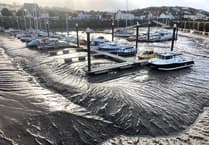THE Environment Agency has been condemned for ‘cravenly climbing down’ in the face of a demand by EDF Energy to be excused from providing an acoustic fish deterrent (AFD) for its Hinkley Point C nuclear power project.
The UK/Ireland Nuclear Free Local Authorities (NFLA) has urged the agency not to waive the requirement, which anti-nuclear campaigners estimate would save the ives of 11 billion fish furing the power station’s operating life.
It said the agency’s latest recommendation represented a complete volte-face on its previous position on the permit requirements, which was taken after an in-depth examination by an inspection team and verification by the Secretary of State.
NFLA England forum chairman Cllr David Blackburn said: “The consequences of the Environment Agency granting this concession will be catastrophic for the local fish population and marine environment.
“The NFLA also believes that any variation in the permit sets a dangerous precedent which shall enable EDF Energy to avoid any requirement for AFDs at any future new development initiated by the company in the UK.
“Lastly, it makes a mockery of public consultation, because what is the point responding again and again to consultations and making presentations to inquiries, demonstrating conclusively the validity of your case, when senior civil servants simply cave into any clamour from EDF Energy?
“EDF Energy is attempting to browbeat the Environment Agency into conceding to their demand for the removal of the Acoustic Fish Deterrent because Hinkley Point C is, like the company’s other headline nuclear projects at Flamanville and Olkiluoto, being delivered massively over budget and massively behind schedule.
“We contend that this application is being made by EDF Energy to save money and save time at the expense of the natural environment.
“Hinkley Point C will take millions of gallons of water from the Bristol Channel to cool the plant and then discharge this water back into the sea.
“Without AFDs, alongside other measures for marine life preservation, millions of fish and other forms of sea life will be sucked into the plant every day and killed.
“Unmitigated, operations at Hinkley Point C will also drastically reduce the number of eels successfully making the long journey back to the Sargasso Sea breeding grounds.”
The NFLA has registered its strong objection to any change in the permit for Hinkley Point C.
The consultation is open until Thursday (May 25) and the documentation can be found at:
Responses can be submitted by email to [email protected] or online via Citizen Space tohttps://consult.environment-agency.gov.uk/psc/ta5-1ud-hinkley-point-c-v005-proposed-decision/consultation/intro.
An EDF spokesman said although many power stations had taken cooling water from the Bristol Channel, Hinkley C would be the first to include any fish protection measures at all.
He said two protection measures had been proposed, the first of which was to include a fish recovery and return system and special water intakes.
These were designed to slow down the water entering the cooling system to allow fish to swim away and were also placed in a way which meant tides carried fish over and around the intake heads.
The spokesman said: “It is a big improvement from older power stations that we have seen around our coastlines.
“An acoustic fish deterrent system is a relatively new technology that was in its concept stages when it was proposed in our original planning application.
“We asked to install the first two fish protection measure but make a change to remove the acoustic fish deterrent.
“Even without the acoustic fish deterrent installed, Hinkley Point C will have a negligible impact on the fish populations in the Bristol Channel.
“The worst case predicted effect of Hinkley Point C with the planned two fish protection measures in place varies by species, but would be much less than one per cent.”




